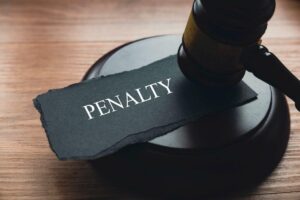The Texas State Board of Public Accountancy (TSBPA) licenses and regulates certified public accountants (CPAs) in Texas. As a result, complaints against these professionals for violations of the Public Accountancy Act or TSBPA rules go to the TSBPA for investigation, evaluation, and initiation of disciplinary proceedings, if necessary.
All too often, complaints and disciplinary proceedings can arise against CPAs who are suffering from alcoholism, substance abuse, depression, or other mental health disorders. Fortunately, the Texas legislature created the Accountants Confidential Assistance Network to assist CPAs with these issues. Nonetheless, as the consequences of disciplinary proceedings can be severe, no matter their source, contacting an experienced Texas CPA license lawyer should be your first step if you receive notice of a complaint against you.
The Accountants Confidential Assistance Network
The Accountants Confidential Assistance Network (ACAN) is a peer assistance group authorized by Texas law to help CPAs, CPA candidates, and accounting students. The purpose of ACAN is to help these individuals with issues related to alcohol, substance abuse, depression, stress, or other mental health issues.
ACAN provides confidential assistance to individuals struggling with these issues, professional mentoring, and group meetings in various locations. This network also offers referrals to professional resources for additional assistance, such as AA groups, recovery centers, and hospitals. ACAN also maintains a helpline that is available 24 hours per day, seven days a week.
More than 25 professional mentors across the state receive eight to 12 hours of training per year, in addition to a robust network of volunteers. ACAN also will participate in interventions if requested by an accounting firm, employer, or family member.
ACAN has grown significantly from what used to be an informal group consisting of a few volunteer CPAs in recovery. Next came the Concerned CPA Network, which was a more organized effort to address substance abuse and mental health issues among CPAs. In 2008, legislators created the fully funded peer assistance program that would become ACAN. In many ways, ACAN is modeled after the Texas State Bar Association’s successful similar program for lawyers.
Referrals to ACAN
When a CPA candidate applies for a CPA license, they must self-report alcohol or drug convictions on that application. TSBPA also performs background checks on applicants. In some cases, TSBPA will send applicants to ACAN.
In other cases, CPAs involved with the legal system due to drug or alcohol issues will be referred to ACAN. CPAs also may self-refer, or professional colleagues, friends, or family members may refer them to ACAN. TSBPA may also send CPAs to ACAN as a condition of their disciplinary proceedings or instead of disciplinary proceedings.
Based on nationwide statistics, up to 10,000 Texas CPAs may be suffering from the effects of substance abuse and/or mental health issues at any time. The TSBPA thus has chosen to take a rehabilitation and preventative approach rather than a purely disciplinary approach to keep CPAs licensed while protecting the public. The idea is to regard substance abuse and mental health issues as treatable medical issues like diabetes or high blood pressure, thereby reducing their stigma and allowing more affected individuals to get the help that they need. The overall goal is also to maintain the ability of CPAs to uphold their ethical duty to provide zealous representation to clients and practice competently while still aiding them in battling their impairments.
When Substance Abuse Contributes to Disciplinary Proceedings
If you have been arrested or convicted of a crime related to substance abuse, or a substance abuse-related matter has led to your disciplinary proceedings before TSBPA, ACAN almost certainly will become involved. Unless you have contracted with alternative forms of treatment that TSBPA and/or a court approves, TSBPA will likely direct you to ACAN for resources.
In fact, in some cases, your ability to avoid a harsher sanction or any sanction may depend on your cooperation with ACAN. For instance, you may enter an agreed consent order with TSBPA that may require you to undergo an assessment with ACAN and follow all treatment recommendations. If you do so and complete the other provisions in your agreed consent order, your disciplinary case will likely be resolved. On the other hand, if you fail to cooperate with ACAN or complete their recommended treatment, you may be subject to continued disciplinary proceedings and potentially harsher sanctions.
Conclusion
The Texas State Board of Public Accountancy plays a crucial role in regulating certified public accountants across the state, ensuring adherence to the Public Accountancy Act and TSBPA rules. While complaints and disciplinary proceedings can arise from various sources, including issues related to substance abuse and mental health disorders, the creation of the Accountants Confidential Assistance Network (ACAN) offers a supportive resource for CPAs facing these challenges. ACAN provides confidential assistance, professional mentoring, and access to treatment resources, embodying a proactive approach to address these issues while maintaining professional standards. For CPAs facing disciplinary proceedings related to substance abuse, cooperation with ACAN often becomes integral to resolving their cases and mitigating potential sanctions. Seeking guidance from an experienced Texas CPA license lawyer, coupled with utilizing the supportive services of ACAN, can help CPAs navigate challenges while safeguarding their professional standing and the public interest.
Click to contact our professional license defense lawyers today
Defend Yourself Against Disciplinary Proceedings Involving Your CPA License
Don’t allow a single complaint from a disgruntled client to affect your career negatively. Losing your professional license can greatly harm your ability to earn a living. If you are facing the loss of your professional license, we can help you take the steps necessary to challenge the allegations against you in your disciplinary proceedings. Contact an accountant license defense attorney at Bertolino LLP, for advice today. Make an appointment by calling (512) 515-9518 or contact us online to see how we can help.
Call or text (512) 476-5757 or complete a Case Evaluation form






